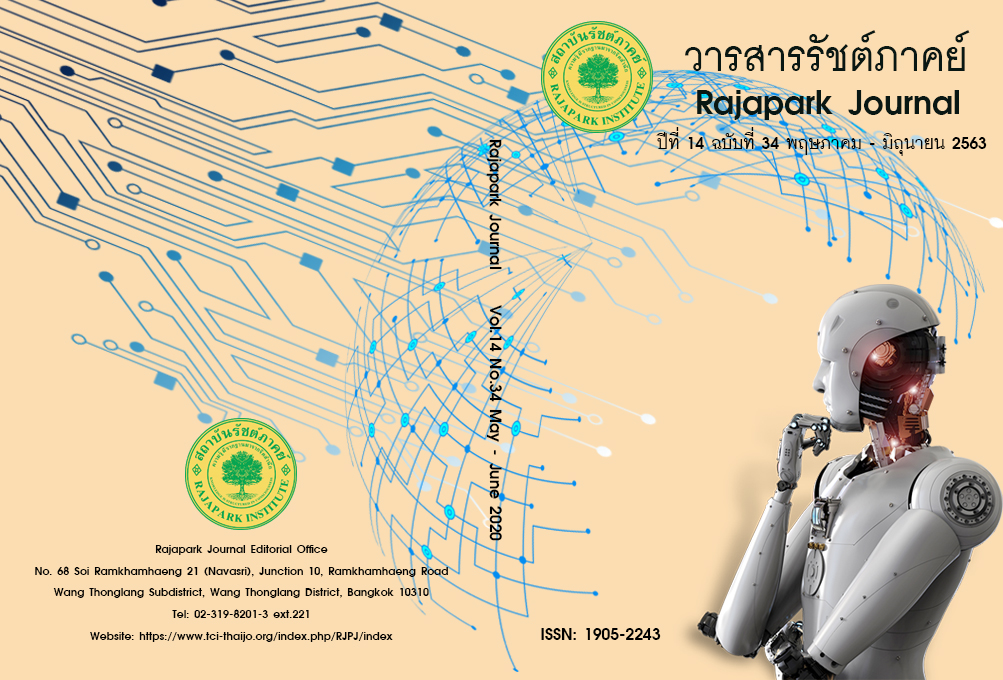Strategy service of the Bangkok Mass Transit Authority That is Friendly Environmentally
Main Article Content
Abstract
This research aimed to 1) study current conditions and assess the enterprise plan 2017-2021 of the Bangkok Mass Transit Authority 2) to study the environmental impact caused by the Bangkok Mass Transit Authority services, and 3) to define the Bangkok Mass Transit Authority's eco-friendly service strategy the samples were 320 employees of the Bangkok Mass Transit Authority and 400 Bangkok Mass Transit Authority users. The questionnaire was used as a research tool. The reliability of the whole version was 0.87 and the key informants were related to the services of the Bangkok Mass Transit Authority. There were 15 interviews. And group meetings are tools for collecting data. Quantitative data. Analyze the data by frequency, percentage, mean, standard deviation. Qualitative data were analyzed using the SWOT technique and content analysis techniques were used. The results of the research revealed that 1) The Bangkok Mass Transit Authority service found that service personnel has a high level of opinions on the quality of the service. While the people who use the service are satisfied with the quality of the service at a moderate level. And the assessment results of the 2017-2021 Enterprise Plan of Bangkok Mass Transit Authority Found that users have opinions about the service, still have a problem at a high level. 2) The environmental impact caused by the service users has a general opinion in providing services at a moderate level, consisting of environmental pollution prevention measures. Should provide electric buses and CNG gas, and should provide free masks to passengers, and 3) the results of the executive review of the Bangkok Mass Transit Authority that are environmentally friendly for executives and those involved in the formulation of the strategic plan Is appropriate to the main organization policy. And present to the director in order to drive the strategy to benefit the people who use the service.
Article Details
Views and opinions appearing in the Journal it is the responsibility of the author of the article, and does not constitute the view and responsibility of the editorial team.
References
Bangkok Mass Transit Authority. (2017a). Annual Action Plan 2017. Bangkok: Bangkok Mass Transit Authority.
Bangkok Mass Transit Authority. (2017b). Enterprise Plan 2017-2021. Bangkok: Bangkok Mass Transit Authority.
Constitutional law of the Kingdom of Thailand. (2017). (Draft) Constitution referendum. Book Referendum Information as of 19 August 2017.
Department of Land Transport. (2017). Sustainable transportation system development. Bangkok: Office of Traffic Transport Policy and Planning.
Freeman, A. Myrick. (2003). The Measurement of Environmental and Resource Values: Theory and methods (2nd ed.). Washington, D.C: RFF Press book.
Ministry of Transport. (2017). Strategic plan Ministry of Transport Year 2017. Bangkok: Ministry of Transport.
Mintzberg, H. et al., (1998). Strategy Safari: A Guided Tour through the Wilds of Strategic Management. Prentice Hall: Upper Saddle River.
Pollution Air Control Department. (2017). Air quality and noise. Retrieved March 7, 2017, from http://www.pcd.go.th/infoserve/air.html.
Transportation Research Board. (1997). TCRP Report 47: A Handbook for Measure Customer Satisfaction and Service Quality, National Research Council, Washington, D.C.
Riewmongkol, T. (1978). A study of users' attitude towards services provided by Bangkok Mass
Transit Authority. Master's thesis Department of Commercial Sciences. Chulalongkorn University.
Robbins, Stephen P. (1990). Organization Theory: Structure, Design, and Applications. New Jersey: Prentice-Hall.
Stufflebeam, D. L. et al. (1971). Educational evaluation and decision making. Illinois F.E. Peacock.


